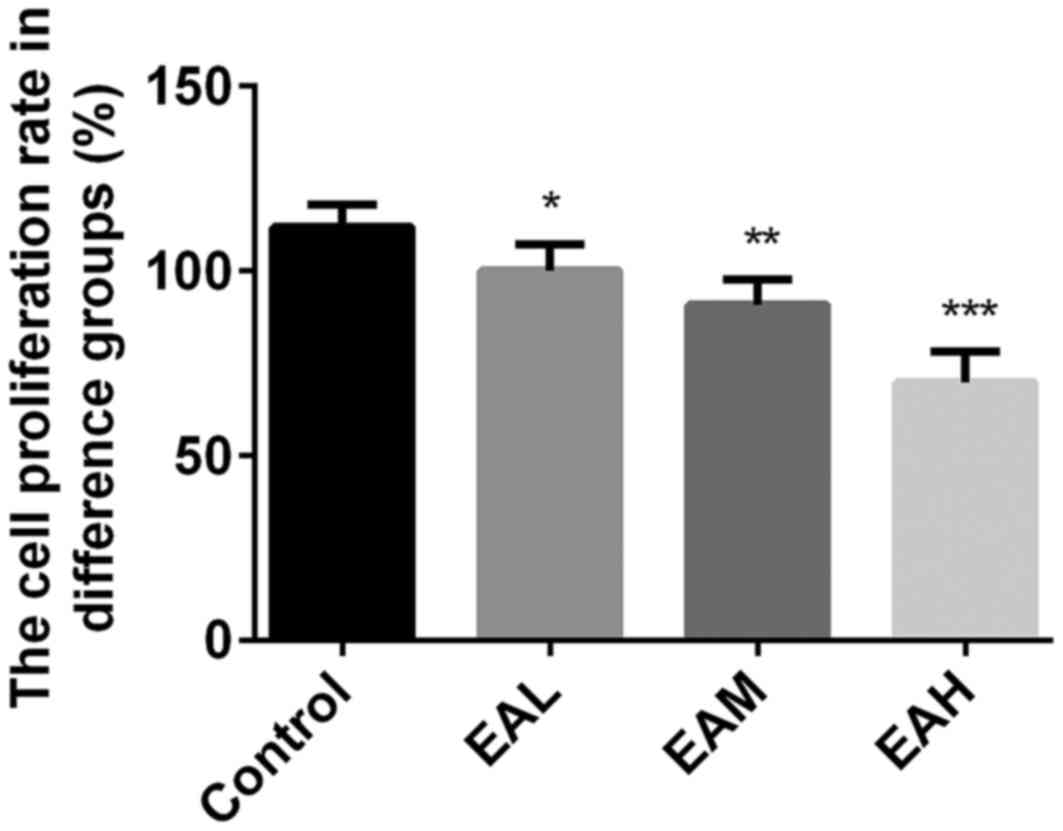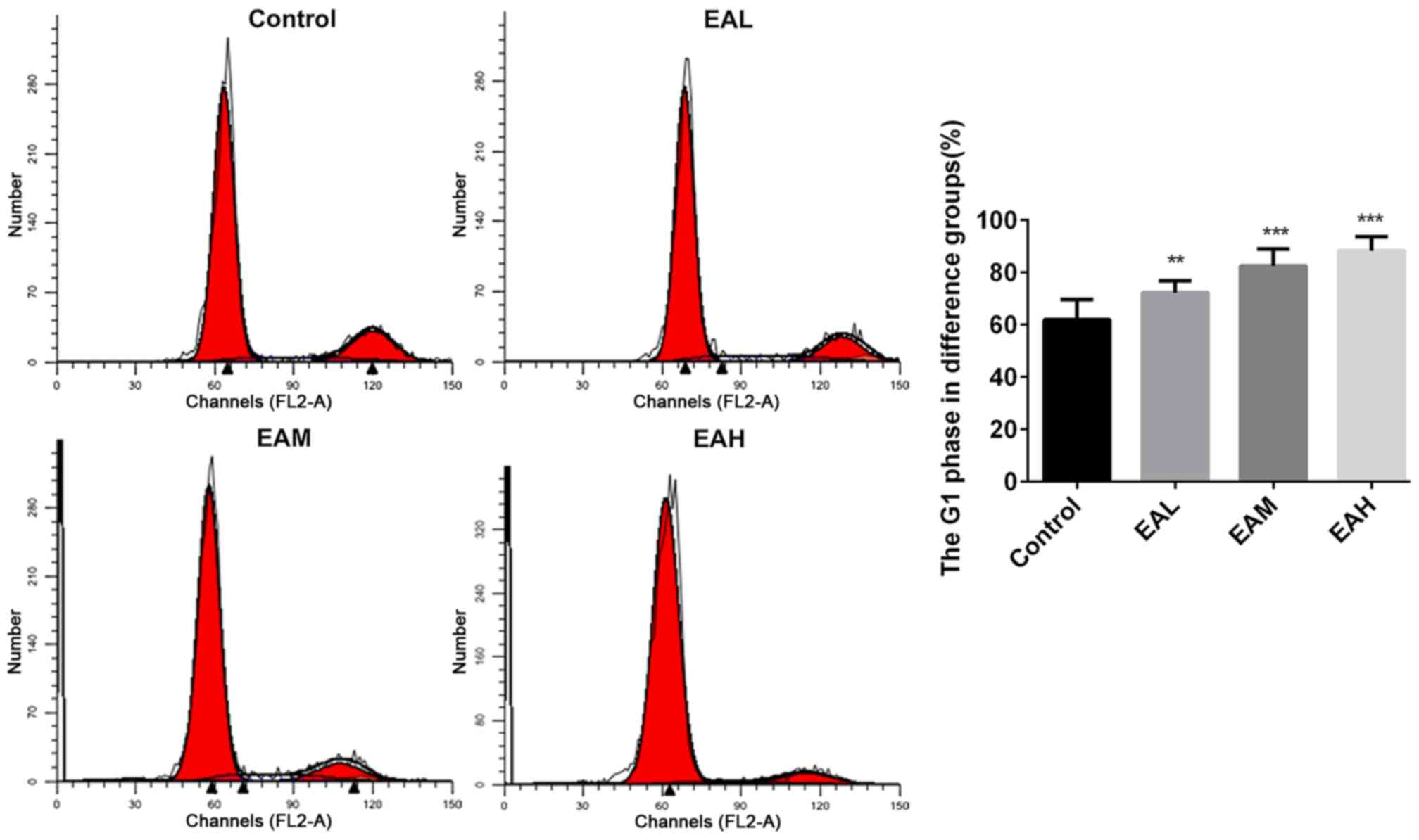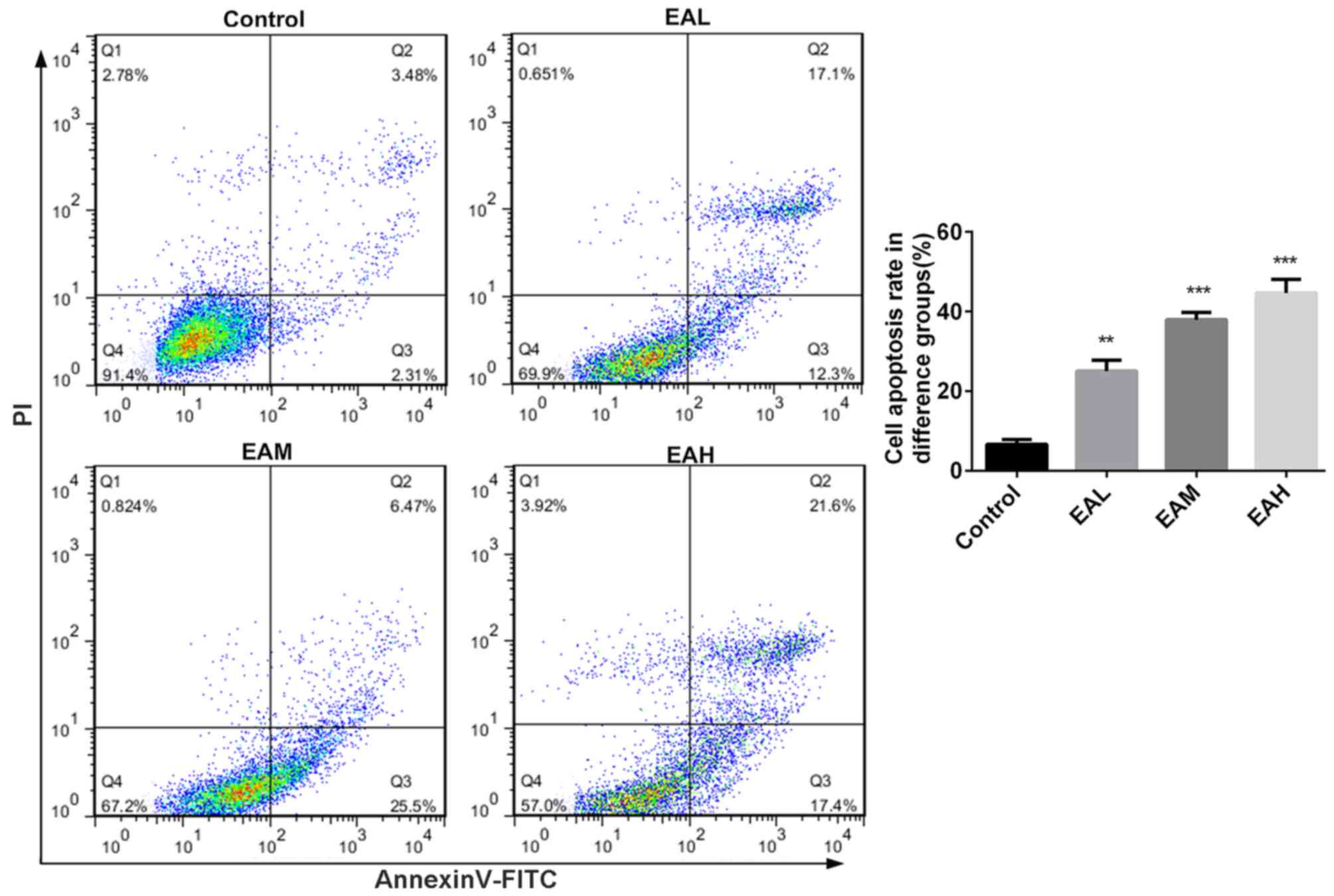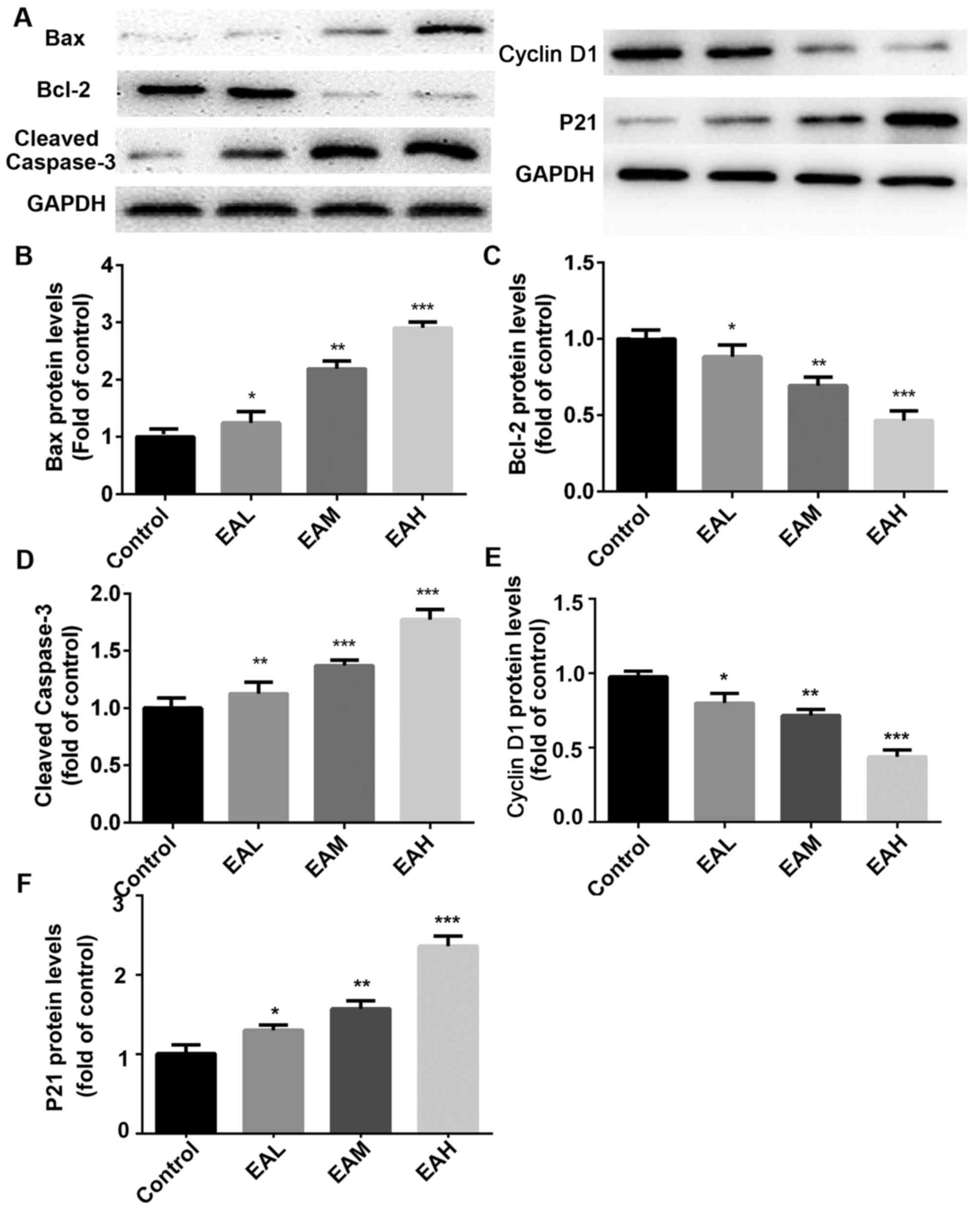|
1
|
Torre LA, Bray F, Siegel RL, Ferlay J,
Tieulent Lortet J and Jemal A: Global cancer statistics, 2012. CA
Cancer J Clin. 65:87–108. 2015. View Article : Google Scholar : PubMed/NCBI
|
|
2
|
Subramaniam S, Thakur RK, Yadav VK, Nanda
R, Chowdhury S and Agrawal A: Lung cancer biomarkers: State of the
art. J Carcinog. 12:32013. View Article : Google Scholar : PubMed/NCBI
|
|
3
|
Zhang L, Huang Y, Zhuo W, Zhu Y, Zhu B and
Chen Z: Fisetin, a dietary phytochemical, overcomes
Erlotinib-resistance of lung adenocarcinoma cells through
inhibition of MAPK and AKT pathways. Am J Transl Res. 8:4857–4868.
2016.PubMed/NCBI
|
|
4
|
Lim SM, Syn NL, Cho BC and Soo RA:
Acquired resistance to EGFR targeted therapy in non-small cell lung
cancer: Mechanisms and therapeutic strategies. Cancer Treat Rev.
65:1–10. 2018. View Article : Google Scholar : PubMed/NCBI
|
|
5
|
Dalvi MP, Wang L, Zhong R, Kollipara RK,
Park H, Bayo J, Yenerall P, Zhou Y, Timmons BC, Rodriguez-Canales
J, et al: Taxane-platin-resistant lung cancers Co-develop
hypersensitivity to jumonjic demethylase inhibitors. Cell Rep.
19:1669–1684. 2017. View Article : Google Scholar : PubMed/NCBI
|
|
6
|
Chen JH, Lee KY, Hu CJ and Chung CC:
Coexisting myasthenia gravis, myositis, and polyneuropathy induced
by ipilimumab and nivolumab in a patient with non-small-cell lung
cancer: A case report and literature review. Medicine (Baltimore).
96:e92622017. View Article : Google Scholar : PubMed/NCBI
|
|
7
|
Mocanu MM, Nagy P and Szöllősi J:
Chemoprevention of breast cancer by dietary polyphenols. Molecules.
20:22578–22620. 2015. View Article : Google Scholar : PubMed/NCBI
|
|
8
|
Sarkar S, Siddiqui AA, Mazumder S, De R,
Saha SJ, Banerjee C, Iqbal MS, Adhikari S, Alam A, Roy S and
Bandyopadhyay U: Ellagic acid, a dietary polyphenol inhibits
tautomerase activity of human macrophage migration inhibitory
factor and its pro-inflammatory responses in human peripheral blood
mononuclear cells. J Agr Food Chem. 63:4988–4998. 2015. View Article : Google Scholar
|
|
9
|
Benvenuto M, Fantini M, Masuelli L, De
Smaele E, Zazzeroni F, Tresoldi I, Calabrese G, Galvano F, Modesti
A and Bei R: Inhibition of ErbB receptors, Hedgehog and NF-kappaB
signaling by polyphenols in cancer. Front Biosci (Landmark Ed).
18:1290–1310. 2013. View
Article : Google Scholar : PubMed/NCBI
|
|
10
|
Marzocchella L, Fantini M, Benvenuto M,
Masuelli L, Tresoldi I, Modesti A and Bei R: Dietary flavonoids:
Molecular mechanisms of action as anti-inflammatory agents. Recent
Pat Inflamm Allergy Drug Discov. 5:200–220. 2011. View Article : Google Scholar : PubMed/NCBI
|
|
11
|
Talcott ST and Lee JH: Ellagic acid and
flavonoid antioxidant content of muscadine wine and juice. J Agr
Food Chem. 50:3186–3192. 2002. View Article : Google Scholar
|
|
12
|
Zhao M, Tang SN, Marsh JL, Shankar S and
Srivastava RK: Ellagic acid inhibits human pancreatic cancer growth
in Balb c nude mice. Cancer Lett. 337:210–217. 2013. View Article : Google Scholar : PubMed/NCBI
|
|
13
|
Ceci C, Tentori L, Atzori MG, Lacal PM,
Bonanno E, Scimeca M, Cicconi R, Mattei M, de Martino MG,
Vespasiani G, et al: Ellagic acid inhibits bladder cancer
invasiveness and in vivo tumor growth. Nutrients. 8:pii: E744.
2016. View Article : Google Scholar : PubMed/NCBI
|
|
14
|
Malik A, Afaq S, Shahid M, Akhtar K and
Assiri A: Influence of ellagic acid on prostate cancer cell
proliferation: A caspase-dependent pathway. Asian Pac J Trop Med.
4:550–555. 2011. View Article : Google Scholar : PubMed/NCBI
|
|
15
|
Narayanan BA, Geoffroy O, Willingham MC,
Re GG and Nixon DW: p53/p21 (WAF1/CIP1) expression and its possible
role in G1 arrest and apoptosis in ellagic acid treated cancer
cells. Cancer Lett. 136:215–221. 1999. View Article : Google Scholar : PubMed/NCBI
|
|
16
|
Ho CC, Huang AC, Yu CS, Lien JC, Wu SH,
Huang YP, Huang HY, Kuo JH, Liao WY, Yang JS, et al: Ellagic acid
induces apoptosis in TSGH8301 human bladder cancer cells through
the endoplasmic reticulum stress-and mitochondria-dependent
signaling pathways. Environ Toxicol. 29:1262–1274. 2014.PubMed/NCBI
|
|
17
|
Gul M, Aliosmanoglu I, Uslukaya O, Firat
U, Yüksel H, Gümüs M and Ulger BV: The protective effect of ellagic
acid on lung damage caused by experimental obstructive jaundice
model. Acta Chir Belg. 113:285–289. 2013. View Article : Google Scholar : PubMed/NCBI
|
|
18
|
Favarin Cornelio D, Teixeira Martins M, de
Andrade Lemos E, de Freitas Alves C, Chica Lazo JE, Sorgi Artério
C, Faccioli LH and Rogerio Paula A: Anti-inflammatory effects of
ellagic acid on acute lung injury induced by acid in mice.
Mediators Inflamm. 2013:1642022013.PubMed/NCBI
|
|
19
|
Ho CC, Huang AC, Yu CS, Lien JC, Wu SH,
Huang YP, Huang HY, Kuo JH, Liao WY, Yang JS, et al: Ellagic acid
induces apoptosis in TSGH8301 human bladder cancer cells through
the endoplasmic reticulum stress- and mitochondria-dependent
signaling pathways. Environ Toxicol. 29:1262–1274. 2014.PubMed/NCBI
|
|
20
|
Morgan TM, Koreckij TD and Corey E:
Targeted therapy for advanced prostate cancer: Inhibition of the
PI3K/Akt/mTOR pathway. Curr Cancer Drug Targets. 9:237–249. 2009.
View Article : Google Scholar : PubMed/NCBI
|
|
21
|
Ye G, Lu Q, Zhao W, Du D, Jin L and Liu Y:
Fucoxanthin induces apoptosis in human cervical cancer cell line
HeLa via PI3K/Akt pathway. Tumor Biol. 35:11261–11267. 2014.
View Article : Google Scholar
|
|
22
|
Scrima M, De Marco C, Fabiani F, Franco R,
Pirozzi G, Rocco G, Ravo M, Weisz A, Zoppoli P, Ceccarelli M, et
al: Signaling networks associated with AKT activation in non-small
cell lung cancer (NSCLC): New insights on the role of
phosphatydil-inositol-3 kinase. PLoS One. 7:e304272012. View Article : Google Scholar : PubMed/NCBI
|
|
23
|
Xu CX, Jin H, Shin JY, Kim JE and Cho MH:
Roles of protein kinase B/Akt in lung cancer. Front Biosci (Elite
Ed). 2:1472–1484. 2010.PubMed/NCBI
|
|
24
|
Umesalma S, Nagendraprabhu P and
Sudhandiran G: Ellagic acid inhibits proliferation and induced
apoptosis via the Akt signaling pathway in HCT-15 colon
adenocarcinoma cells. Mol Cell Biochem. 399:303–13. 2015.
View Article : Google Scholar : PubMed/NCBI
|
|
25
|
Kim ND, Mehta R, Yu W, Neeman I, Livney T,
Amichay A, Poirier D, Nicholls P, Kirby A, Jiang W, et al:
Chemopreventive and adjuvant therapeutic potential of pomegranate
(Punica granatum) for human breast cancer. Breast Cancer Res Treat.
71:203–217. 2002. View Article : Google Scholar : PubMed/NCBI
|
|
26
|
Mitsiades CS, Mitsiades N and Koutsilieris
M: The Akt pathway: Molecular targets for anti-cancer drug
development. Current Cancer Drug Targets. 4:235–256. 2004.
View Article : Google Scholar : PubMed/NCBI
|
|
27
|
Song G, Ouyang G and Bao S: The activation
of Akt/PKB signaling pathway and cell survival. J Cell Mol Med.
9:59–71. 2005. View Article : Google Scholar : PubMed/NCBI
|
|
28
|
Saglam O, Garrett CR, Boulware D, Sayegh
Z, Shibata D, Malafa M, Yeatman T, Cheng JQ, Sebti S and Coppola D:
Activation of the serine/threonine protein kinase AKT during the
progression of colorectal neoplasia. Clinical Colorectal Cancer.
6:652–656. 2007. View Article : Google Scholar : PubMed/NCBI
|
|
29
|
Hanahan D WR: The hallmarks of cancer.
Cell. 2000. View Article : Google Scholar
|



















